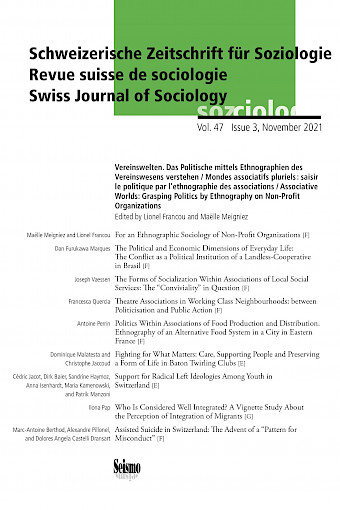
ISBN 978-3-03777-255-3
184 Seiten
2021
Format 15.5 x 22.5 cm
broschiert
In den Warenkorb
SFr. 48.00 / € 44.00Vereinswelten. Das Politische mittels Ethnographien des Vereinswesens verstehen
Lionel Francou, Maëlle Meigniez (Hrsg.)
Dieses Themenheft soll aufzeigen, wie die Ethnographie dazu beiträgt, die Soziologie der Vereine zu erneuern, indem sie es ermöglicht, die politische Dimension in ihren unterschiedlichsten Definitionen und Erscheinungsformen, ob gewöhnlich oder außergewöhnlich, institutionalisiert oder informell, genauer zu erfassen. Es präsentiert einen dreifachen Fokus: die Vereine als Forschungsobjekt, die Ethnografie als methodologischer Ansatz und das Politische als Analyseperspektive. Die fünf in dieser Ausgabe versammelten Beiträge, die eine organisatorische und demokratische Pluralität sichtbar machen, führen in das Herz dieser pluralistischen Vereinswelten ein und hinterfragen, wie das Politische aus den Vereinen hervorgehen kann, wobei ein besonderes Augenmerk auf die Vereinsformen, ihre Tätigkeitsbereiche und ihre nationalen oder kulturellen Kontexte gelegt wird. Diese Texte tragen dazu bei, die Beziehung zwischen Vereinen und Politik zu beleuchten, hauptsächlich anhand von drei Fragestellungen: Wie kann die Ethnographie die politische Dimension der Vereine erfassen? Inwiefern sind Vereine ein bevorzugter Ort für die Entstehung des Politischen? Welche Bedeutung(en) haben die Vereinsaktionen in einer doppelten Bewegung der Ablehnung und der Teilnahme an der politischen Aktion?
Ce numéro thématique entend souligner comment l’ethnographie contribue à renouveler la sociologie de l’association, en permettant d’en saisir plus finement la dimension politique dans ses définitions et apparitions les plus variées, ordinaires ou extraordinaires, institutionnalisées ou informelles. Il se repose sur une triple focale : l’association comme objet de recherche, l’ethnographie comme approche méthodologique et le politique comme angle d’analyse. Donnant à voir une pluralité organisationnelle et démocratique, les cinq contributions rassemblées dans ce numéro initient une plongée au cœur de ces mondes associatifs pluriels et interrogent les façons dont le politique peut émerger des associations, en apportant une attention spécifique aux formes d’association, à leurs secteurs d’activité et à leurs contextes nationaux ou culturels. Ces textes contribuent à éclairer la relation entre association et politique, principalement autour de trois questionnements : comment l’ethnographie permet-elle de rendre compte de la dimension politique des expériences associatives ? En quoi les associations constituent-elles un lieu d’émergence privilégié du politique ? Quel(s) sens revêtent les actions associatives dans un double mouvement de rejet et de participation à l’action politique ?
This thematic issue aims to highlight how ethnography contributes to renewing the sociology of non-profit organizations, by allowing us to grasp its political dimension in its most varied definitions and appearances, whether ordinary or extraordinary, institutionalised or informal. It is based on a triple focus: the non-profit organizations as a research object, ethnography as a methodological approach, and politics as an angle of analysis. Offering an organisational and democratic plurality, the five contributions gathered in this issue investigate these plural associative worlds and question the ways in which politics can emerge from non-profit organizations, by paying specific attention to the forms of these organizations, their sectors of activity, and their national or cultural contexts. These texts contribute to shed light on the relationship between non-profit organizations and politics, mainly around three questions: how does ethnography make it possible to account for the political dimension of non-profit experiences? In what way do these organizations form a privileged place of emergence of politics? What meaning(s) do their actions take on in a double movement of rejection and participation in political action?
